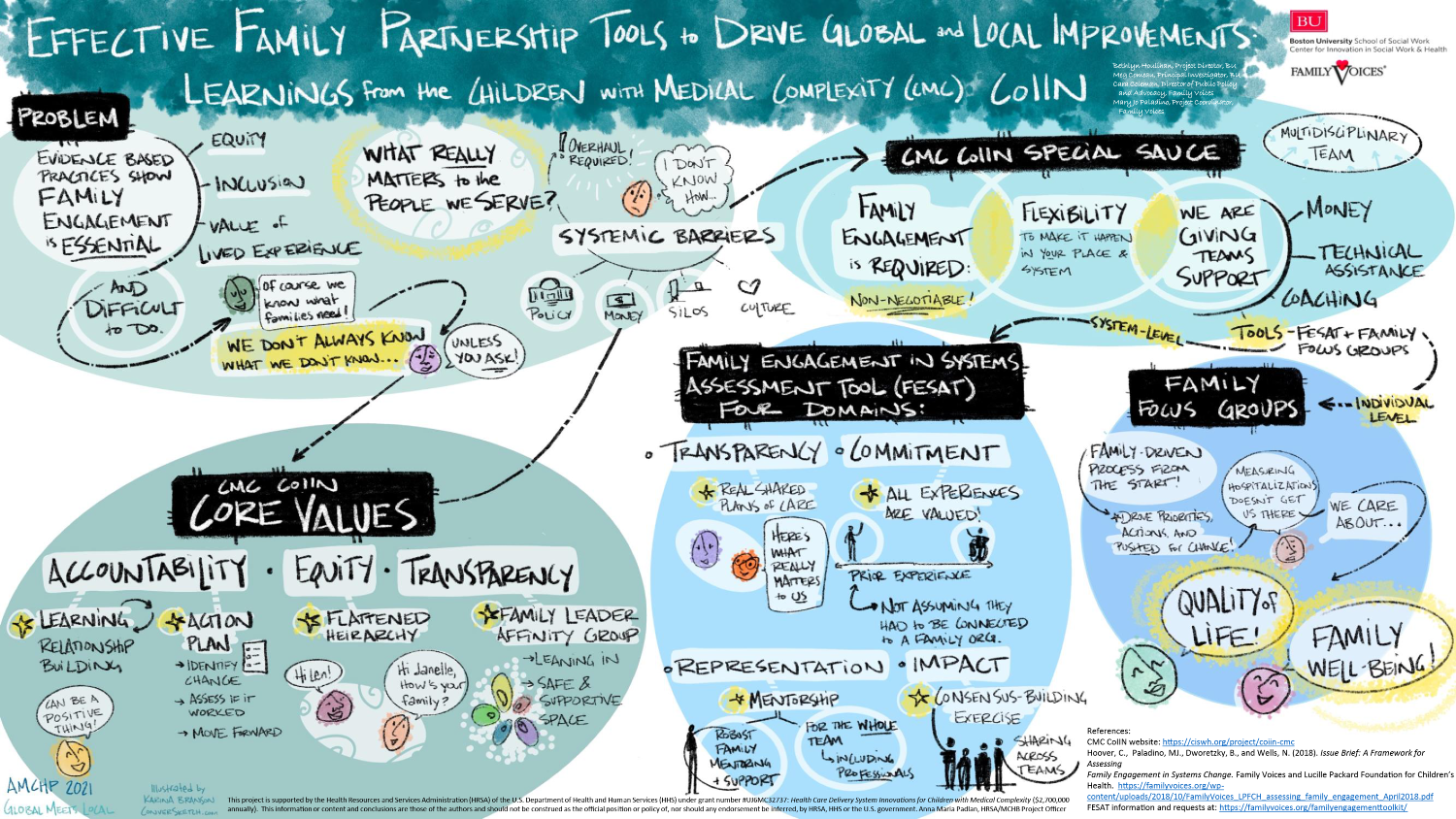Tuesday, March 08, 2022

This graphic was originally presented at the Association for Maternal and Children Health (AMCHP) 2021 national conference and created by Karina Branson at ConverSketch.
The Collaborative Improvement and Innovation Network to Advance Care for Children with Medical Complexity (CMC CoIIN) team at the Center for Innovation in Social Work & Health, alongside partner organization Family Voices National, has released a new infographic that shares CMC CoIIN’s learnings on how to build robust and meaningful family partnerships that lead to improved quality and innovation in clinical systems of care. The tips in this infographic can help elevate and integrate family leaders as equal partners in this important work.
The Problem
Bringing families on board is not done consistently and can be challenging. How does one get started with family outreach? How do clinics and healthcare organizations make sure that community voices are heard?
It Starts With Values
CMC CoIIN works with teams to embed family engagement by making sure that teams and organizations have three core values baked into their action plan:
- Accountability: Outline an action plan to ensure that your team is truly working towards implementing family engagement and partnerships.
- Equity: Everyone involved must be on the same playing field. Doctors, family members, and other members of the care team all play a valuable role in improving care for children with medical complexities.
- Transparency: CoIIN organizes family leader affinity groups where family leaders can bring their true, and sometimes challenging experiences and work through them together before bringing them back to the larger team. Affinity groups provide a safe and supportive space that honors the community’s lived experiences and builds trust with the wider team.
Systemic Barriers
Values provide a good starting point for family partnership work, but it’s important to be aware of the inherent systemic barriers that prevent teams from putting them into practice. These barriers include:
- Family leaders deserve to be paid for their invaluable work, however funding is often not allocated for this role nor is it built into medical family advisory board policies.
- Families are often not seen as equal members of the care team.
- Larger systems changes are required to break down silos and truly engage with families and build strong relationships.
CoIIN’s Proof of Performance
CoIIN has a proven plan to combat these systemic barriers:
- Family engagement is required. Every single team must have family leaders engaged in their leadership team.
- Flexibility is key when it comes to working with families and interdisciplinary teams. CoIIN takes an adaptive approach when it comes to supporting teams by incorporating their specific needs.
- CMC CoIIN supports teams with technical assistance and coaching. They provide ongoing instruction on how to work together as a multi-disciplinary team where family partners play an active role.
Tools for Individual and System Change
Family Focus Groups Facilitator Guide
View the tool
Each state team is required to host focus groups with family members of kids who are enrolled in the clinical program. The focus groups asked families about their child’s quality of life, as well as overall family wellbeing. CoIIN developed a family-driven process in which family leaders come up with the focus group questions, approach, and structure. Rather than simply looking at hospitalization rates or other quantitative data, these focus groups give teams a fuller picture of children and family needs.
Family Engagement in Systems Assessment Tool (FESAT)
View the tool
The FESAT tool helps teams understand family engagement’s role within a medical system. Teams will assess family engagement within four categories and score themselves before coming together to discuss progress and reach consensus on how the work can move forward. These four categories are:
- Transparency: Do families feel like they know what’s going on behind the scenes in regards to their child’s care? Are family needs represented in decision-making and policies?
- Commitment: Does the clinic really have commitment to family engagement and family partnership? Are families involved in tangible ways that can be measured?
- Representation: Are diverse families represented in systems level decisions? Does your family leader and general interdisciplinary team match the patient population that you’re working with in terms of different identities i.e. race, disability status, etc.?
- Impact: Does the work that you’re doing in terms of family engagement and partnership actually make a difference? Are the patients who are coming into the clinic feeling the effects of these efforts?
CMC CoIIN is an HRSA-funded project that aims to improve the quality of life for children with medically complex conditions and their families, and increase the cost-effectiveness of their care. The project is housed at the Center for Innovation in Social Work & Health (CISWH) at Boston University School of Social Work.
For more information on the CMC CoIIN’s work around family engagement and family partnership, please visit their website.